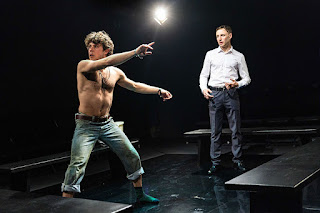Barry is a recovering alcoholic and clearly damaged by something in his past, but the play is more interested in the less obvious but possibly more destructive trauma that the more seemingly controlled brother is living with.
Steven is haunted by the death of his father when he was 15 and Barry was 10, but he later starts to believe himself haunted in a much more literal way as well. He also convinces himself, with no apparent evidence, that the baby his wife Debbie (Katie Buchholz) is carrying must be his brother's. The story takes place over the nine months of Debbie's pregnancy, which also takes in Barry starting to finally find some success with his art, and their mother Liz (Kacey Ainsworth) moving out of the house the family grew up in, and stirring up all its secrets.
Like most of Ridley's work this is incredibly dark but shot through with twisted humour, and the four-strong cast bring the right level of intensity in Harrison's stripped-back production - Kit Hinchcliffe's in-the-round design is essentially four benches, with the occasional extra prop brought on. With little of the magic realism found in much of Ridley's work this ends up an on-the-nose look at depression, alcoholism and control, and I had a fairly mixed reaction to it: I found the plot took a bit too much time to resolve itself, and wasn't sold on some of the twists it took.
On the other hand I find the themes Ridley has spun into the script keep sparking new ideas in my brain about how it all ties together. Not just in the recurring motifs - here it's teeth being knocked out, images from the two World Wars, and the little sayings and catchphrases that people repeat - but in the hints and clues about the family dynamic. Given Barry is a talented artist who couldn't make a living out of it, Steven making a successful career out of cleaning away other people's art feels pointed. There's also gaps in the story that suggest that Steven, the only character to ever address the audience, is a version of the unreliable narrator; in a low-key way he might be one of the most monstrous characters Ridley has created, which is saying something.
It feels like a bit of a stretch but the revelations at the end of the play even made me think of Brimstone and Treacle: Dennis Potter's play is built around the idea of an evil miracle, and Leaves of Glass also culminates in a seemingly beautiful act with absolute horrors behind it. It doesn't bring quite the same fireworks as some of his other plays, but it's addictively, grimly fascinating to pick out the themes of manipulation and power play woven through the script.
Leaves of Glass by Philip Ridley is booking until the 3rd of June at Park Theatre 90.
Running time: 1 hour 50 minutes straight through.
Photo credit: Mark Senior.





No comments:
Post a Comment